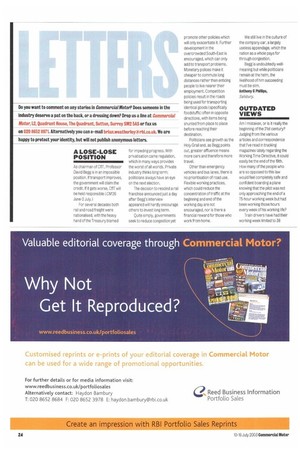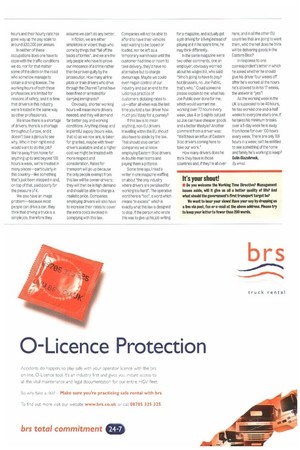Do you want to comment on any stories in Commercial
Page 24

Page 25

If you've noticed an error in this article please click here to report it so we can fix it.
Motor? Does someone in the industry deserve a pat on the back, or a dressing down? Drop us a line at Commercial Motor, L2, Quadrant House, The Quadrant, Sutton, Surrey SM2 5AS or fax us on 020 8652 8971 Alternatively you can e-mail brlan.weatherley*rbi.co.ulL We are happy to protect your identity, but will not publish anonymous letters.
A LOSE-LOSE POSITION
As chairman of CflT, Professor David Begg is in an impossible position. If transport improves, the government will claim the credit. If it gets worse, CM' will be held responsible ( CM26 June-2 July.) For several decades both rail and road freight were nationalised, with the heavy hand of the Treasury blamed for impeding progress. With privatisation came regulation, which in many ways provides the worst of all worlds. Private industry thinks long term: politicians always have an eye on the next election.
The decision to rescind a rail franchise announced just a day after Begg's interview appeared will hardly encourage others to invest long term.
Quite simpY, governments seek to reduce congestion yet promote other policies which will only exacerbate it. Further development in the overcrowded South-East is encouraged, which can only add to transport problems. Monetary polices make it cheaper to commute long distances rather than enticing people to live nearer their employment. Competition policies result in the roads being used for transporting identical goods (specifically foodstuffs) often in opposite directions, with items being shunted from place to place before reaching their destination.
Politicians see growth as the Holy Grail and, as Begg points out, greater affluence means more cars and therefore more travel.
Other than emergency vehicles and bus lanes, there is no prioritisation of road use. Flexible working practices, which could reduce the concentration of traffic at the beginning and end of the working day are not encouraged, nor is there a financial reward for those who work from home. We still live in the culture of the company car, a largely useless appendage, which the nation as a whole pays for through congestion.
Beg is undoubtedly wellmeaning but while politicians remain at the helm, the likelihood of him succeeding must be gm.
Anthony C Phillips,
Salisbury.
OUTDATED VIEWS
Am I mistaken, or is it really the beginning of the 21st century? Judging from the various articles and correspondence that I've read in trucking magazines lately regarding the Working Time Directive, it could easily be the end of the 19th. How many of the people who are so opposed to this law would feel completely safe and confident boarding a plane knowing that the pilot was not on approaching the end of a 75-hour working week but had been working those hours every week of his working life?
Train drivers have had their working week limited to 38 hours and their hourly rate has gone way up the pay scale to around £30,000 per annum.
In neither of these occupations does one have to cope with the traffic conditions we do, nor for that matter some of the idiots on the road who somehow manage to obtain a driving licence. The working hours of both these professions are limited for reasons of safety, and it is time that drivers in this industry were treated in the same way as other professionals.
We know there is a shortage of drivers; there is a shortage throughout Europe, and it doesn't take a genius to see why. Who in their right mind would want to do this job? We're away from home for anything up to and beyond 100 hours a week, we're treated in many places—particularly in this country—like something that's just been stepped in and, on top of that, paid poorly for the pleasure of it.
We also have an image problem—because most people can drive a car, they think that driving a truck is a simple job, therefore they assume we can't do any better.
In fiction, we are either simpletons or violent thugs who come by things that 'fall off the backs of lorries", and we are the or4 people who have to prove our innocence of a crime rather than be proven guilty by the prosecution, How many airline pilots or train drivers who drive through the Channel Tunnel have been fined or arrested for carrying immigrants?
Obviously, shorter working hours will mean more drivers needed, and they will demand far better pay and working conditions. Anything cheap and in plentiful supply (hours wise, that is) as we now are, is taken for granted, maybe with fewer drivers available and at a higher cost we might be treated with more respect and consideration. Rates for transport will go up because the only people exempt from this law will be owner-drivers; they will then be in high demand and should be able to charge a realistic price. Companies employing drivers will also have to increase their rates to cover the extra costs involved in complying with this law. Companies will not be able to afford to have their vehicles kept waiting to be tipped or loaded, nor be left as a temporary warehouse until the customer had time or room to take delivery, they'd have no alternative but to charge demurrage. Maybe we could even regain control of our industry and put an end to the ludicrous practice of customers dictating rates to us—after all when was the last time you told a taxi driver how much you'd pay for ajourneyP If this law is to mean anything, non-EU drivers travelling within the Eli should also have to abide by the law. That should stop certain companies we all know employing Eastern Bloc drivers in double-man teams and paying them a pittance.
Some time ago, I read a writer in one magazine waffling on about "the only industry where drivers are penalised for working too hard". The operative word here is "too", a word Wnich means "in excess" which is exactly what this law is designed to stop. If the person who wrote this was to give up his job writing for a magazine, and actually get a job driving for a Wing instead of playing at it in his spare time, he may think differentiy.
In the same magazine were two other comments, one an employer, obviously worried about his wages bill, who said: "Who's going to have to pay? Not Brussels, no. Joe Public, that's who." Could someone please explain to me: what has Joe Public ever done for me, which would warrant me working over 72 hours every week, plus 4 or 5 nights out just so Joe can have cheaper goods and a better lifestyle? Another comment from a driver was: "We'll have an influx of Eastern Bloc drivers coming here to take our work."
How many drivers does he think they have in those countries and, if they're all over here, and in all the other EU countries that are going to want them, who the hell does he think will be delivering goods in the Eastern Bloc?
In response to one correspondent's letter in which he asked whether he should give his driver four weeks off after he's worked all the hours he's allowed to in his 17 weeks, the answer is "yes"I As the working week in the UK is supposed to be 40 hours, he has worked one-and-a-half weeks to everyone else's one. If he takes his minimum breaks over a 5-day week he is away from home for over 100 hours every week. There are only 168 hours in a week; isn't he entitled to see something of the home and family he's working to keep? Colic Glazebrook,
By email.




































































































































































